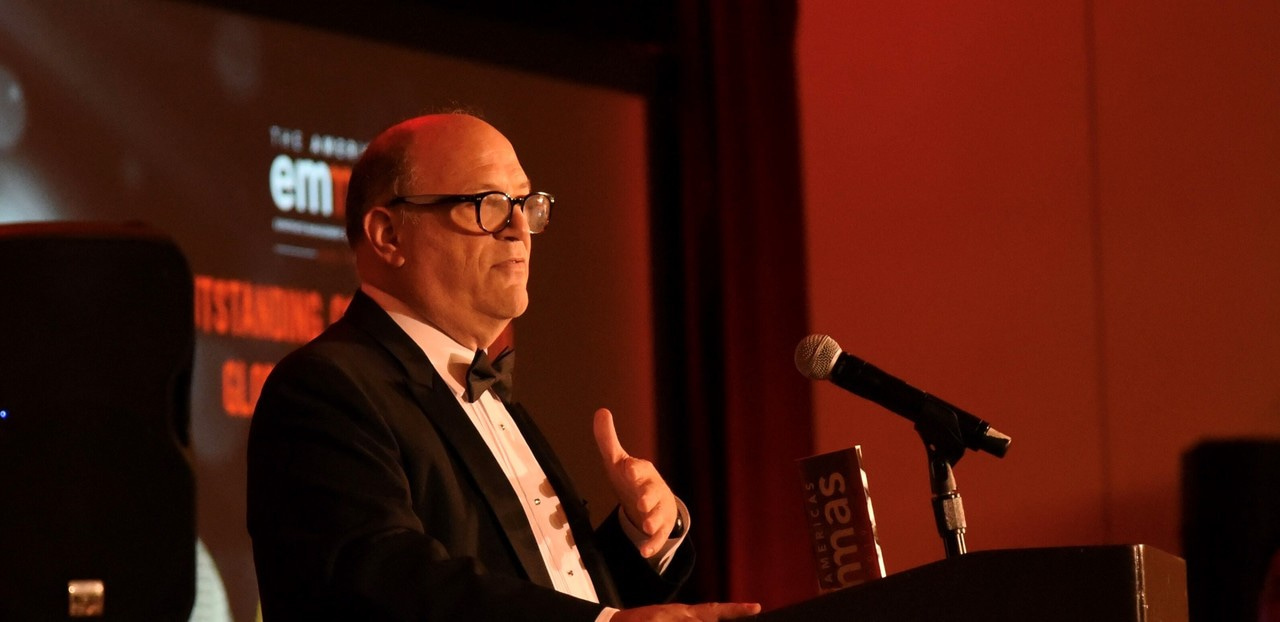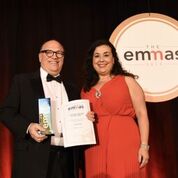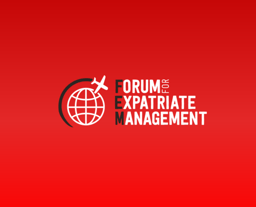Robert D. Lesser – recipient of FEM’s Americas EMMA for his Outstanding Contribution to Global Mobility 2019

Unlike all the other EMMAs which are solely assessed by a team of independent judges, this award, for the Outstanding Contribution to Global Mobility is in the gift of FEM and so it is particularly special to the team.
Robert has been a valued judge at the EMMAs and an influential speaker at FEM’s global mobility events for a number of years. Often outspoken and never afraid to cause controversy, Robert is highly valued for his incisive wit and original mind.
Berna Anderson, last year’s recipient of the award, presented Robert with his EMMA trophy, but before she revealed his identity, I teased the audience with a few (surprising) details about Robert’s early life and career.
Following the news of his award, I asked Robert for some further thoughts on his career and global mobility:
Claire Tennant-Scull (CTS): How did you begin your career in global mobility?
Robert Lesser (RB): I began my career in global mobility by doing international and expatriate tax at a Big Eight accounting firm. I really had no idea about this career while in school but enjoyed the cultural benefits of working with non-Americans. I was then offered a chance to move to London for a couple of years, specializing in the growing expatriate practice at a time when London was becoming a global financial center. Experiencing the ups and downs of an expatriate assignment and the opportunity to work with clients undergoing the same, made me want to focus my career on this.
CTS: You studied Law at UCONN and Oxford, how did your experiences during that time inform your global mobility career?
RB: While studying law, I found the international aspects to be the most interesting. At Oxford, my focus was the then-titled EEC and I was struck by the approach that the European states had taken to band together while sacrificing some national sovereignty. My interests and exposure resulted in being asked to transfer to the UK when London was growing as an international financial center to service the tax and relocation issues of those global executives. It has certainly been intriguing to watch the challenges of maintaining European integration and how even 30 years later, the UK changed its mind about that trade-off and is now going its own way (seemingly).
A changing landscape
CTS: How have the expats and assignees changed over the course of your career so far?
RB: When looking at expat populations from 30 years ago, they were traditional families with white male heads, many of whom went from assignment to assignment as professional expatriates. It was a unique skill that interested only a few, and they were assets to be moved to whatever location was necessary. During those past 30 years, the population is increasingly diverse, not only in gender, nationality and age, but also in the stages of their careers. More people are interested in working outside their home country and more companies are interested in spreading that experience across a wider range of people. International experience is valued by both sides and that has made working in the industry that much more interesting.
The importance of good judgement
CTS: You have generously shared your knowledge and insights at a number of FEM events for global mobility professionals, why is this important to you and what do GM professionals need to further explore or push higher up their business agenda?
RB: It is important to me to do my part in helping other GM professionals advance the profession and their own careers. While it might be difficult, I think the best hope for them is be proactive, not only fostering positive change, but also in avoiding negative change. By showing this leadership they will likely achieve a higher level of respect and be sought for their views, not merely for their implementation. Anything I can do to make that easier for them is something I have valued. This is consistent with my view that "Best Practice" is not always the same as "Common Practice" and learning from the mistakes of others can be very helpful in avoiding problems.
CTS: At our Americas Summit in Dallas, you took part in a lively discussion about managing talent and ROI. Why is this particularly relevant to you?
RB: In my experience, judgement cannot always be replaced with numbers. And ROI is extremely hard to reduce to a number - and what is the point? It is a fact that expats are more expensive than locals - good management will still send them when they feel it is the best answer and should avoid sending them when it is not necessary to the company or the individual. ROI assumes that the benefits are tangible - in most good companies I have been exposed to, the major benefits are INTANGIBLE - it makes a company more global - better for their customers, their employees and their products or services. To attempt to calculate this and reduce it to a number is too complex and won't result in justifying sending or not sending someone on an expensive assignment. And why do we focus this question so much on expats - do we ask the ROI benefits of providing a new desk or a newer office building or many other decisions that companies make every day? Do we ask ROI on the decisions to allow casual clothing or remote work? How about training expenses? No, we use common sense that these are either good or bad for our companies - our leaders use their judgments. Why should foreign assignments be different?
Why risk is vital
CTS: What have been your biggest challenges in your career so far, how did you deal with them and what do you see as your greatest achievements?
RB: My biggest challenges were in taking risks - making big changes rather than avoiding them. I was very fortunate to work in culture and for bosses who encouraged me and supported me in taking those risks - they never made me feel as if a mistake would ruin my career. I was told to take the risks and if they didn't work, we would fix them. In the expat world, I am most proud of creating a model that balanced outsourced, insourced and self-service providers and a unique tax approach that turned our tax equalization receivables into payables, reducing significant work for various departments. Outside my own employers, I am most proud of helping other companies avoid many of the problems that cash allowances can cause and showing GM professionals how they can take a leadership role rather than an implementation role.
CTS: What are the most important qualities of a global mobility professional and how would you describe the role to someone considering a move into the industry?
RB: I think the most important qualities relate to empathy and risk. Empathy in understanding what the experience of moving overseas is for an employee and their family. This allows them to better address the concerns of the employee and design and administer programs that best respond to those experiences and needs. GM professionals also need to be smart about risk - making sure that good changes are supported and bad changes are avoided. They should be proactive in leading these discussions because having them imposed on you just makes you an implementer not an influencer.
Strategy vs implementaton
CTS: How do you think the discipline has changed and how do you think global mobility can gain more recognition as a distinct 'profession'?
RB: I think a lot of the outsourcing model has had a negative effect on the profession. Management has often believed that this is function that is done by "experts" and see it as implementation rather than influence. Wouldn't it be great if I knew the answer to this? But it is difficult for GM to have the best and the brightest in-house leaders and influencers if the function is not seen as strategic. It is the chicken and egg syndrome - if they are not viewed that way, then they will not bring in or support those GM professionals who could be leaders and if they don't bring in those types of GM leaders, the function will be only implementers and quality people will not gravitate to it.
CTS: What is the best thing about the work you do?
RB: I hope that my experience as a service provider, a GM leader and a procurement specialist helps me make a difference in making buyers better buyers, sellers better sellers and providers better providers.
Broader, important interests
CTS: You’re also on the Board of Directors at the Israel-Palestine Cooperative for Economic Expansion and have worked hard toward a peace solution – how does this fit with your career and why is it important to you?
RB: My career has focused on solving problems in international business. I found that the business approach was lacking in solving other world problems and that using that approach might bring fresh ideas and perspectives to political issues. I wanted to do my part in solving problems and while no one can yet claim to have solved the difficult issues of the Middle East, I know that my approach and ideas have been well received and when the parties are ready to address the issues again, these might prove helpful in getting to a new reality.
What this award means...
CTS: Finally, what does being given this award mean to you?
RB: We all spend a lot of our time trying to do the best job we can, regardless of whether anyone is watching or aware. It is very special to know that one's efforts are noticed and appreciated, especially by others who have experienced the same. This award means that my peers are aware and value my efforts and I hope that this example will inspire others - I see the GM profession as a relay race rather than a sprint - I am honored to take the baton from another leader and pass it to the next, as together we advance the profession.

Robert receives his award from Berna Anderson, Dallas May 23





Please sign in or register for FREE
Sign in OR sign up to become a registered The Forum for Expatriate Management website user
Subscribe here